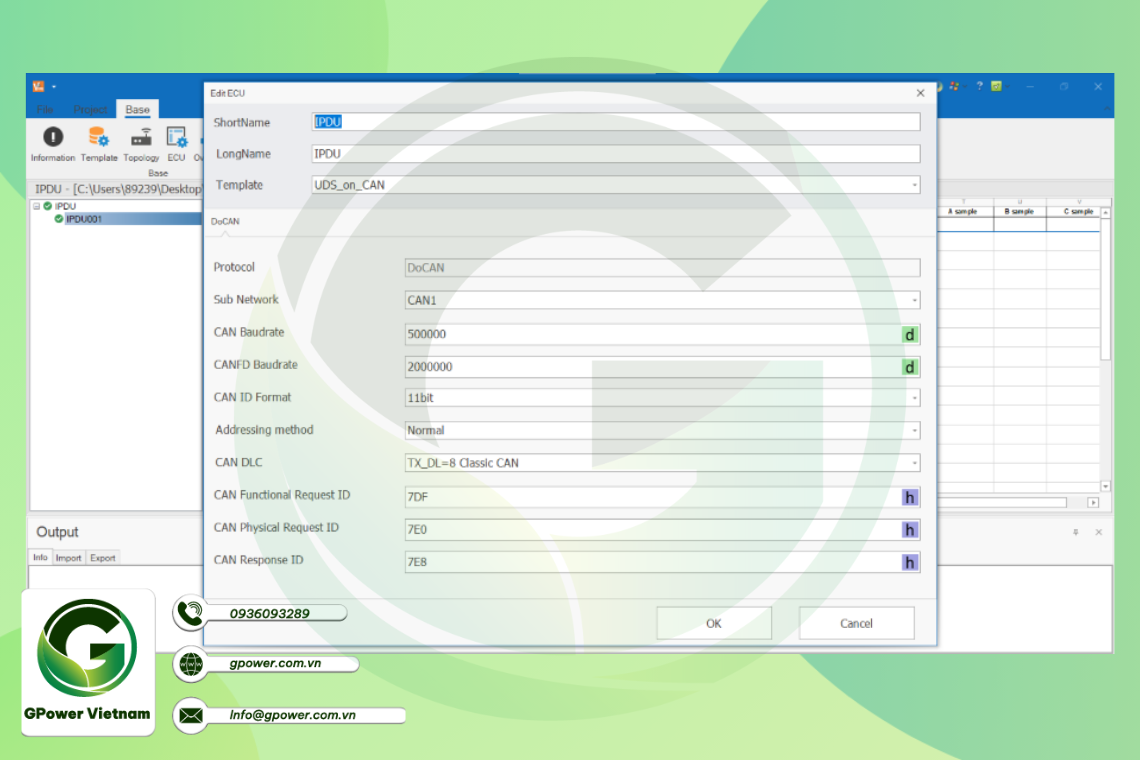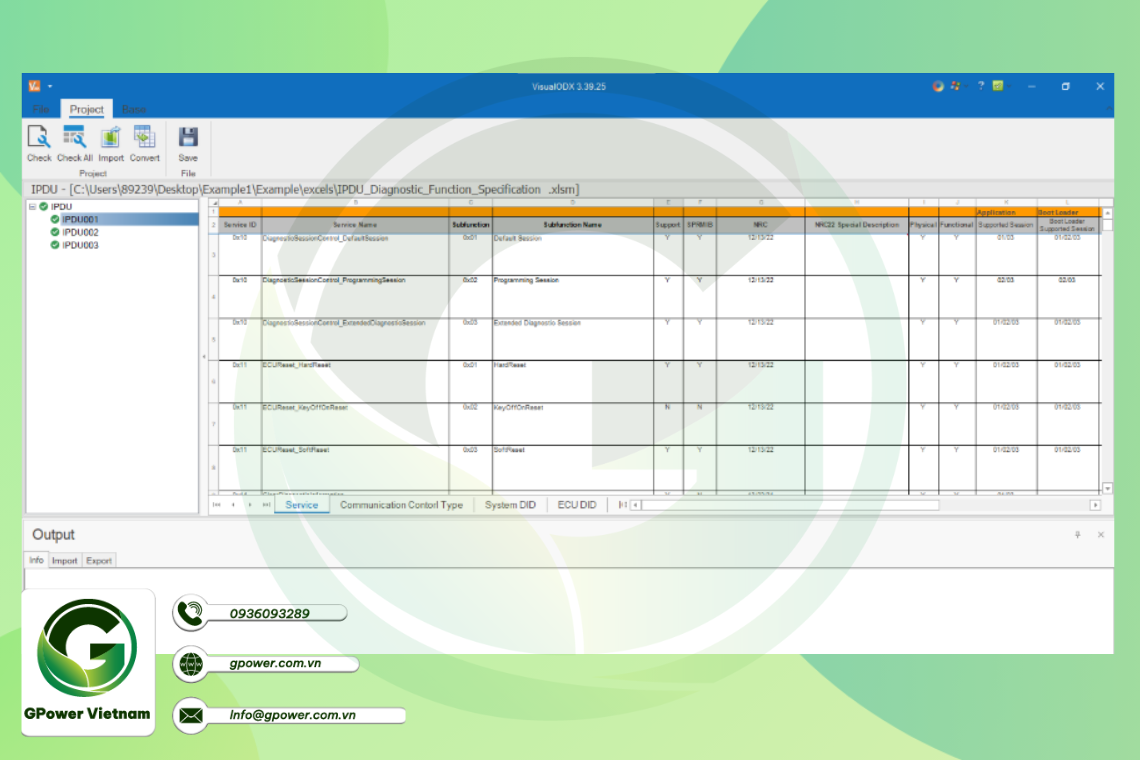I. CDD Introduction
CDD file (CANdela Diagnostic Descriptions) is a diagnostic database file defined by Vector, Germany, describing the diagnostic service specification of ECUs and related para-meter format definitions, such as ECU identification, DTC, security levels, sessions, etc. It is mainly used for the development and testing of ECUs.
Usually we need to generate a CDD file based on CDDT and database editing; CDDT, i.e. CDD template, represents the OEM's definition of the vehicle diagnostic specification and does not store specific parameter information.

(Figure 1: CDDT vs CDD content difference, source from Vector website)
The CDD file structure contains ECU information, Diagnostic Trouble Codes, Common Diagnostics/Base, Variants, State, Data Types and Negative Responses. Among them:
ECU Information: Define ECU address information, time parameters, etc.
Diagnostic Trouble Codes: Stores DTC information.
Common Diagnostics/Base Variant: Storage base diagnostic services as well as DID, RID, and failure parameters are defined.
Variants: Used for different phases or versions of the same controller, modified on the base diagnostic information.
States: Define the session mode, the security level and the corresponding switching state of the service.
Data Types: Defines the data type in the parameter.
Negative Responses: Defines the supported negative response codes.
II. Comparison of the characteristics of the CDD and ODX formats
- 1. ODX is an international standard defined by ASAM and ISO, and the data format corresponds to the specification ISO22901-1, while CDD is a Vector private format.
- 2. ODX can package the whole vehicle ECUs into a PDX release, which is easy to manage and suitable for OEM, while CDD corresponds to one file for a single ECU, which is generally used by suppliers for ECU development and testing.
- 3. ODX has the concept of layers, for example: -D stores the description of the whole vehicle ECU diagnostic information, -V is the vehicle topology definition, -F stores the Flash file for flashing, and each layer inherits the data of the previous layer to avoid data redundancy.

(Figure 2: ODX vs CDD)
- 4. ODX is developed by the OEM and is suitable for the whole life cycle (ODX data structure is complex); while CDD is developed for ECU development and is suitable for the development and testing phase (CDD data structure is simple).
- 5. ODX is open protocol, while CDD is private format.
III. Introduction to VisualODX
For the creation of diagnostic database, WINDHILL developed the diagnostic design tool — VisualODX, which can export diagnostic data with one-click by importing diagnostic questionnaires. Currently, it supports ODX/ PDX/ CDD/ DEXT/ ATXML files and mass data processing, which greatly improves work efficiency and accelerates development progress.

(Figure 3: VisualODX Product Families)
CDD export now supports all CDD properties and is available for tools such as CANoe, CANoe.Diva, DaVinci, CANdela Studio by Vector.
| Application Field:
- • OEM diagnostic function development and debugging stage, diagnostic database construction and testing.
- • Production department whole vehicle database creation.
- • After-sales department creates diagnostic database, combined with diagnostic instrument to carry out after-sales inspection.
- • ECU supplier diagnostic function development and testing.
| Software Advantages:
- • Software customisation: semi-customisable software tools to support the expansion of customer-specific functions.
- • Software support for floating version: floating version of the licence, without plugging the hardware dongle can be used, convenient for the use of off-site office team.
- • Project Management: Innovative project configuration interface for easy project engineering management.
- • Standard Excel template: User-friendly and quick to achieve the whole vehicle Excel questionnaire creation.
- • Support multiple ECUs/diagnostic questionnaires import: Support single or multiple Excel import, unlimited number of Excel sheets.
- • Supports exporting ODX/PDX/CDD/DEXT/ATXML files for a single ECU or all ECUs.
- • One-click check: follow the ASAM standard ODX templates, Excel templates combined with double-checking to effectively ensure that the generation of data integrity, accuracy. Support for analysing and locating error messages.
- • One-click conversion: automatically generate ODX/PDX/CDD/DEXT/ATXML files.
| Software Features:
- 1. Add ECU information: Support to add information of multiple ECUs for the project, the number of ECU is not limited.
 (Fugure 4: ECU Configuration)
(Fugure 4: ECU Configuration)
- 2. Add ODX Template: Import customised ODX templates for projects.

(Figure 5: ODX Template Import)
- 3. Import Excel: Click Link to import the Excel sheet. Multiple EVs can be added to the ECU and the number of EVs is unlimited.

Figure 6: Import Excel
- 4. Consistency checking: The errors are displayed in the Output area below, and double click also allows error location.

Figure 7: Consistency Checking
- 5. Convert Function: Convert ODX/ PDX/ CDD/ DEXT/ ATXML files. Not only support for exporting files for individual ECU, but for exporting for multiple or all ECUs in a project.

Figure 8: Convert Function
If there any questions, we are more than happy to support you.





